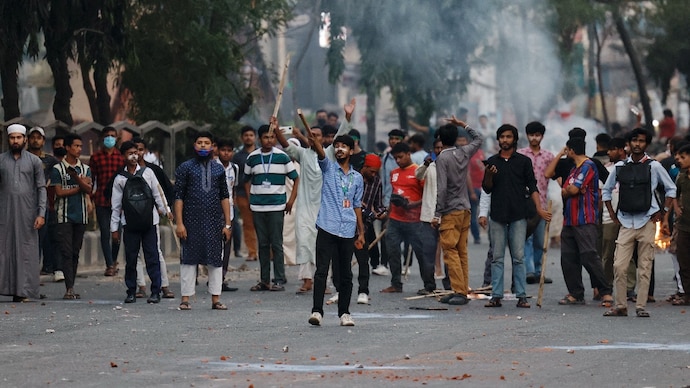
Bangladesh is witnessing intense nationwide unrest after the International Crimes Tribunal (ICT) sentenced ousted Prime Minister Sheikh Hasina to death for crimes against humanity linked to the 2024 student uprising that toppled her government. Supporters of the Awami League clashed with rival groups and police forces across multiple cities, including the capital Dhaka, resulting in two fatalities during violent altercations involving tear gas, batons, and heavy crowd-control measures.
Security forces had been deployed preemptively across Dhaka and other major districts in anticipation of widespread protests following the ICT ruling. Demonstrators blocked highways, launched marches, and engaged in direct confrontations with law enforcement. According to multiple Bangladeshi media outlets, police responded with tear gas shells, sound grenades, and baton charges to disperse the growing crowds.
Throughout the day, Dhaka remained under severe tension as several videos circulated on social media showing officers chasing protesters, deploying stun grenades, and using force to break up gatherings. The situation intensified in several neighbourhoods where large crowds attempted to regroup despite warnings from authorities.
One of the most volatile scenes unfolded in Dhanmondi 32, home to Sheikh Mujibur Rahman—Bangladesh’s founding father and Hasina’s father. Local media reported that protesters attempted to march toward the location and damage the historic residence, prompting police to intervene aggressively.
Supporters of the Awami League—now banned under the Muhammad Yunus–led interim administration for its role in the 2024 anti-government agitation—found themselves in fierce clashes with members of Jatiya Chhatra Shakti, a newly formed organisation representing the coordinators of last year’s student rebellion.
In the days leading up to the verdict, the Awami League had announced a two-day nationwide bandh, condemning what Hasina labelled a “politically driven” and “unjust” tribunal decision. This shutdown further escalated tensions, building momentum for the mass protests that erupted once the judgement was announced.
Details of the Sheikh Hasina ICT Verdict
The ICT ruled against the 78-year-old Awami League leader on three major counts: incitement of violence, issuing orders that resulted in the killing of protesters, and failure to prevent atrocities committed during the student-led uprising of 2024. Since being removed from power on August 5 of the previous year, Hasina has lived in exile in New Delhi, following months of unrelenting anti-government demonstrations.
Former Inspector General of Police (IGP) Chowdhury Abdullah Al-Mamun, who turned state witness and confessed guilt, was handed a five-year prison sentence. In contrast, former Home Minister Asaduzzaman Khan received the same death penalty as Hasina under the tribunal’s ruling.
The landmark judgement—delivered just months before Bangladesh’s parliamentary elections scheduled for early February—is expected to reshape the nation’s political trajectory dramatically. While Hasina vehemently condemned the ruling as “biased,” “politically orchestrated,” and “the result of a tribunal without democratic legitimacy,” interim leader Muhammad Yunus praised the decision, asserting that no figure, regardless of power, is beyond the reach of law.
| Key Individuals | ICT Verdict | Associated Allegations |
|---|---|---|
| Sheikh Hasina | Death Penalty | Incitement, murder orders, failure to stop atrocities |
| Asaduzzaman Khan | Death Penalty | Role in repression of student protesters |
| Chowdhury Abdullah Al-Mamun | 5 Years Imprisonment | Turned state witness; admitted involvement |
Following the verdict, Bangladesh formally approached India seeking the immediate return of Hasina and Kamal, accusing them of involvement in the deadly crackdown on student demonstrators in July of the previous year.
New Delhi issued a measured response, stating that it had “taken note” of the tribunal’s ruling while reaffirming its commitment to the welfare of the Bangladeshi people. India emphasized that it remains dedicated to supporting peace, stability, democratic processes, and inclusive governance across Bangladesh.
“As a close neighbour, India remains committed to the peace, democracy, inclusivity, and stability of Bangladesh. We continue to engage constructively with all stakeholders for the benefit of the Bangladeshi people,” the Ministry of External Affairs (MEA) noted in its official statement.
For breaking news and live news updates, like us on Facebook or follow us on Twitter and Instagram. Read more on Latest World on thefoxdaily.com.






COMMENTS 0